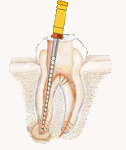
Root Canal vs Tooth Extraction
Tooth extraction and root canal treatment are the only alternative treatments in case of a tooth infection that has damaged the pulp causing a dental abscess.
If the infected tooth is left untreated the infection can spread to other parts of your body. So you have to quickly make the right choice on which way to clear the infection, by root canal treatment or extracting the tooth.
Should tooth extraction considered as root canal alternative?
Many people believe that having a tooth extracted is a good alternative to having root canal treatment. A simple tooth extraction is less expensive, faster and more straight-forward procedure than a root canal treatment (learn more about the Cost of Root Canal Treatment). At a first look, removing the tooth might seem as an attractive solution vs root canal. But actually this solution might not be the easiest or least expensive treatment choice in the long run. The following are some of the reasons why tooth extraction is not the best choice, when you consider root canal versus extraction.
When a tooth is missing its neighboring teeth tend to shift to the empty place. This can increase the risk of crooked teeth, bad bite and/or a temporomandibular joint disorder affecting proper biting and chewing. Teeth that have shifted from their original position tend to become loose much easier and they are more susceptible to dental problems.
In order to avoid these complications, in most cases dentists recommend that any tooth that has been extracted should be replaced. Replacing a tooth that has been extracted with an artificial one may require a dental bridge or an implant, to prevent adjacent teeth from shifting and restore chewing function. So, the real alternative to a root canal treatment is a tooth extraction followed by replacing the lost tooth with a dental bridge, implant or a removable partial denture.
Root canal therapy is more cost effective than the combination of tooth extraction and dental bridge or implant. The cost of dental implants that provide the best functional alternative is about $3000 per tooth. These alternatives not only are more expensive than a root canal procedure but require more treatment time and additional procedures to adjacent teeth and supporting tissues.
Besides the cost, time effectiveness, and reduced complexity of root canal treatment, nothing is better than your natural teeth. And root canal treatment is the only way to save an infected tooth.
When tooth extraction is the only solution?
The only cases that tooth extraction may be recommended instead of an endodontic treatment are related with situations when the restorability of the tooth is questionable. If the tooth has suffered extensive damage because of the tooth decay, there may not be enough tooth structure to support the restoration of the tooth. If the dentist confirms that there is enough tooth structure to restore the tooth, root canal treatment is always the best decision versus extraction.
Conclusion on root canal vs extraction
If you have the choice, it's always best to keep your original teeth. Endodontic treatment has a very high success rate, and treated teeth can be maintained for many years after the initial treatment. Even if a root canal fails, there are still treatment options with very good success rates such as root canal retreatment and endodontic surgery.
In most cases, endodontic therapy (root canal) is a clear winner in the dilemma root canal vs tooth extraction.
![]() The cost involved with dental treatments is significant and many patients may not afford it if they are not covered by their dental insurance.
Learn how to choose a dental insurance plan that will help you provide the best dental treatment to yourself and your family.
The cost involved with dental treatments is significant and many patients may not afford it if they are not covered by their dental insurance.
Learn how to choose a dental insurance plan that will help you provide the best dental treatment to yourself and your family.

